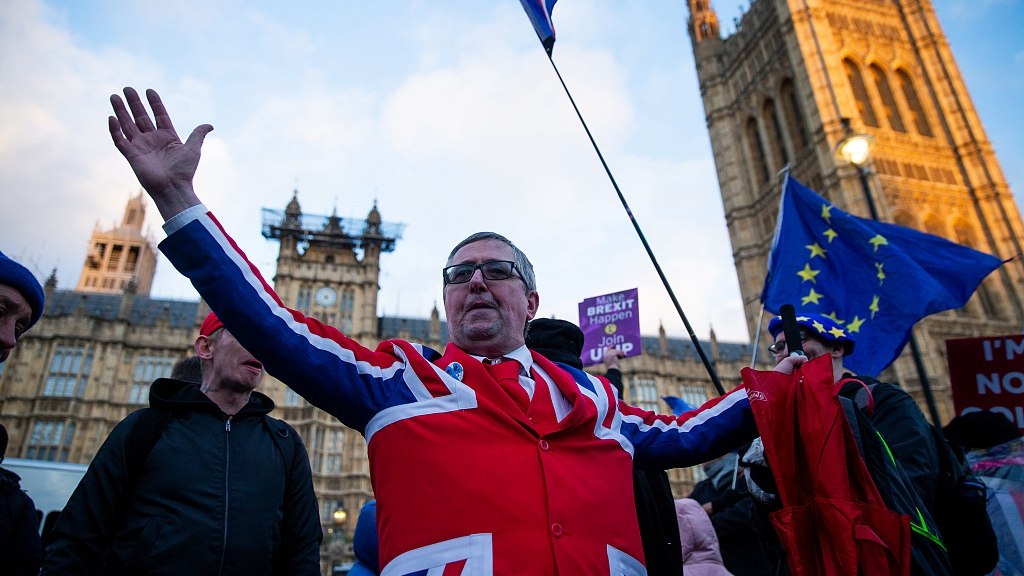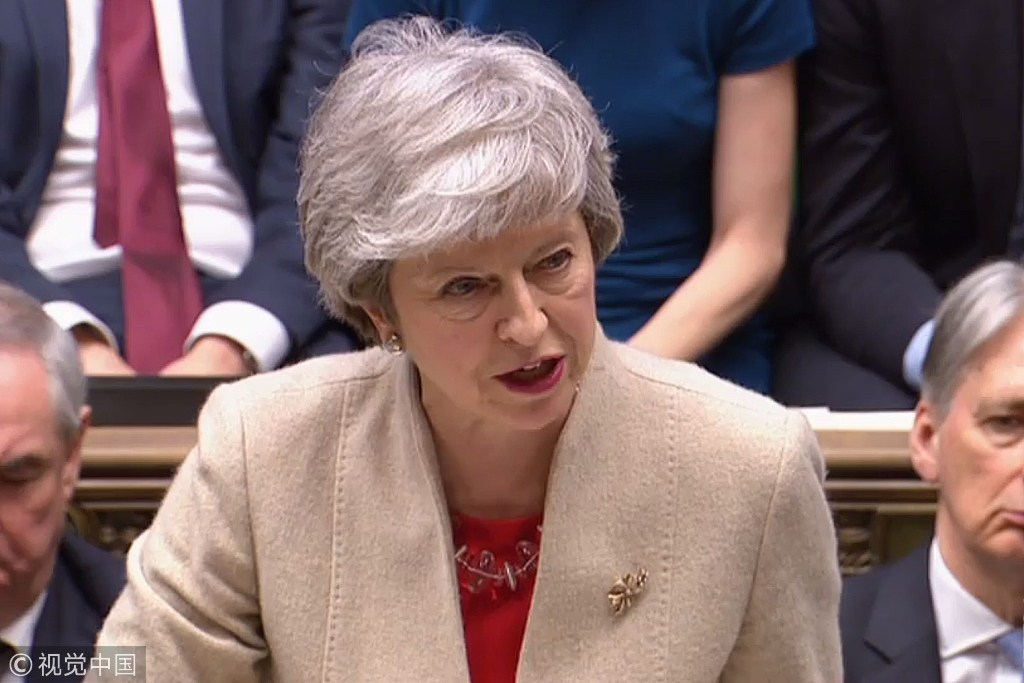
Opinion
10:36, 03-May-2019
UK local elections could give clues to future of Brexit
Chris Deacon

Editor's note: Chris Deacon is a postgraduate researcher in politics and international relations at the University of London who previously worked as an international commercial lawyer. The article reflects the author's opinion, and not necessarily the views of CGTN.
On May 2, local elections were held in the United Kingdom. While these elections themselves might not be of major importance on the international stage, they offer important guidance as to how the UK's political parties are faring.
Most importantly, the success or failure of the governing Conservative Party and the main opposition Labour Party will give us clues as to how Brexit might pan out in future months.

Pro-Brexit supporters gather in London, March 29, 2019. /VCG Photo
Pro-Brexit supporters gather in London, March 29, 2019. /VCG Photo
The reason for this is that it seems increasingly likely that a general election may be called in the coming months in the UK. Theresa May's own Conservative Party – and particularly the hard-line Eurosceptics within it – are in open revolt against their own leader.
Internal party rules mean that it is currently impossible for them to directly remove her, but if pressure mounts high enough, and particularly if it spreads to her Cabinet, May could have little choice but to resign.
This, in itself, would not technically trigger a general election as the new Conservative leader would become prime minister automatically. However, there would likely be huge pressure on the government to call a general election.
Given the monumental importance of Brexit, it would surely not be viable to have a prime minister leading the negotiations without them having any personal democratic mandate.
Even if this does not happen, May's government is currently propped up by the Northern Irish Democratic Unionist Party (DUP). The DUP is also very upset at May's handling of the Brexit process and their support – upon which May depends to govern – may be withdrawn.
This is because the “confidence and supply” agreement between the DUP and Conservatives only applies to the current session of Parliament and it appears likely that May will seek to begin a new session in the coming months. This could end the agreement between the parties and leave the Conservatives unable to govern. This would also trigger the call for a general election.
If a general election is indeed called, it is without a doubt that the result would decide the future of Brexit. Should the Conservative Party fail to win enough seats to form a government, May's Brexit deal would likely be dead in the water.

British Prime Minister Theresa May makes a statement in the House of Commons in London, March 29, 2019. /VCG Photo
British Prime Minister Theresa May makes a statement in the House of Commons in London, March 29, 2019. /VCG Photo
If Labour wins a majority, it seems likely at this stage that they would try to negotiate a “softer” Brexit with the EU, possibly including continued membership of the Customs Union and/or the Single Market.
There is also the possibility that Labour might offer the public a second referendum on Brexit, including the option to remain in the EU, although – according to the party's current policy – this will not happen if they can win a general election.
But there is a further scenario which could be of profound importance to the UK's future. If neither the Conservatives nor Labour are able to win a majority of seats, they may need to negotiate a coalition with another party to form a government. It is highly likely that this party (or these parties) would insist on the holding of a second referendum in order to form such an agreement.
That is to say, if the two main parties of British politics perform poorly at the next general election, that could spell the end of Brexit. It is, therefore, of crucial importance to see how both are faring among the public at this week's local elections.
At the same time, we must keep in mind that neither of the newly-formed parties – Change UK and the Brexit Party – are standing in these elections. This makes the situation easier for the main parties than it would be otherwise.
It is also likely that voter turnout will be lower in these elections than it would be at a general election, and there will clearly be some impact on the results caused by genuine local issues rather than national politics dominating entirely.
That said, these elections are perhaps the best “opinion poll” that we can have on the current popularity of the main parties. A bad night for either or both of the Conservative Party and Labour Party will give us major clues as to what might happen in an imminent general election.
Given the major consequences of the results of any such general election, anyone interested in how Brexit will go from here should make sure to keep a keen eye on the local election results as results begin to trickle in.
(If you want to contribute and have specific expertise, please contact us at opinions@cgtn.com.)

SITEMAP
Copyright © 2018 CGTN. Beijing ICP prepared NO.16065310-3
Copyright © 2018 CGTN. Beijing ICP prepared NO.16065310-3